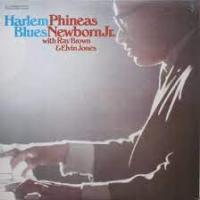-
Posts
4,422 -
Joined
-
Last visited
Content Type
Profiles
Forums
Events
Blogs
Everything posted by Dmitry
-
Something isn't right here. Why doesn't he just hire people to sell his LPs? If he puts 5 f/t guys/gals on commission, let's say even 50%, he should make more than what his wholesale price is. He's offering $5000/day shopping spees. http://www.recordrama.com/invite.htm I'm sure all the desirable titles have been picked over.
-
I will be selling a number of LPs myself in the coming year, once I purge and sort them all. Like you, I will sell as a lot, not individually, so as not to waste time. How did Amoeba price yours? Academy Records in NY buys cds/lps for 1/3 their retail price [whether true or not, I have no idea, but that's what the clerk told me.]
-
...and then you meet someone who's even more hopeless than you.
-
Just got back from the show. 1st half was Konitz, 2nd - Jamal. Nice venue, good acoustics.
-
I'm sorry to disappoint, Jim, but this discussion isn't centered around you and the history of your record buying.
-
It is indeed a bull-shit sentiment. LPs don't automatically sound better than corresponding CDs, especially the 1970s-early 1980s pressings on wobbly, noisy, paper-thin vinyl. At the time of vinyl-cd transition most people had inexpensive direct drive turntables, which they switched to inexpensive major brand cd players. The very positive side of cd was its convenience. CD playback required no set-up skills, no expensive cartridges, produced a very decent sound, etc etc.
-
There are more mp3 players out there than ever before [i don't have the numbers, but it seems obvious], yet the profits from the digital downloads are in a free fall. To me this means that the music is being pilfered, and not purchased.
-
That is simply not the case. :bwallace2: I have many cds pressed in the 1980s that sound very good. Blue Note Works series first appeared in the early 1990s. Many 1980s BN cds sound better than RVG remasters. 1980s OJC cds are quite listenable. Same goes for a bunch of rock cds I've had for 20 years. They sound just fine. Also, if you look at the chart, tapes surpassed LPs in sales way before the cds came up.
-
Uh...maybe. Sometimes. Hardy ever. Almost never. Most of that stuff sounded like crap compared to the analog then, and no matter how much better the playback equipment is today, it still sounds like crap compared to the analog. Maybe a nicer grade of crap, but still... Thus the need (as in true need) for new remasterings that can sound better than the analog, which is what we were supposed to have been buying 30 years ago! Wrong on all counts. Early cd pressings have become quite collectible. Many times they are the most un-compressed, the least messed with by the remastering engineers. Like I said, in the 1980s-early 1990s the quality of the playback equipment was not up to par with the software; 14-bit d/a converters, etc. But no matter how lacking the early cd playback was, it was infinitely better than the pre mid-1970s turntables with 7-10 gram tracking weights, heavy arms, console stereos, etc.
-
They - CDs - were introduced on a major scale long before the quality was where it should have been because there were big bucks to be made right now (all the "perfect sound forever" hype has pretty much been revealed as the BS that it was, as anybody with honest ears could - and was -saying at the time), and they insisted on focusing on the media long after consumer interest was clearly trending otherwise, just because that was all they knew. They feared downloads from jump, big time, precisely because of the implicit/inevitable decentralization involved. But rather than innovate (or at least co-opt, something they've been really good at over the years...), they hunkered down. Lotta good that's done them, and really, it serves them right. Actually, Jim, the quality was there, just like the LP quality was there when it first came out in 1950. If anything, in case of the LP, the playback equipment was quite inferior to the software, the styli poor, the loading weights high, the distortion immense. Today we play records from the 1950s on a much much better playback equipment, and they sound amazing. The same goes for cds; discs pressed in the 1980s sound quite good on today's playback equipment, which is a lot more advanced than it was 25 years ago.
-
Downloads could have been made a salable item early on, if "the industry" would have had even a fraction of a clue about what was going on. Instead of stuffing CDs down our throats at the earliest possible minute (if we knew then what we know now, would we have settled for all that early digital crap?) until the very last possible minute and going all hyper-paranoiac about The Evils Of Copying, they could have realized that digital media by nature meant the decentralization of the supply chain and been proactive instead of reactive. All they were interested in was harvesting the profits, not nurturing the technology. They could probably be making a lot more money now than they are. Oh well! You lost me, dude. What do you mean by stuffing CDs down our throats? I'm not big on hyperbole, I guess.
-
It doesn't have to be either or. I still maintain that the downloads did most of the dirty work. It's just irrefutable. There were other factors, of course, like you say. I will miss going to record stores and browsing for hours, picking up new releases, etc. That's what bugs me the most about this whole thing. Perhaps I am old fashioned, but the actual physical object, like a cd or a record, is important to me; removing the plastic wrapping, picking off the stupid plastic strip on the spine with my fingernail, the smell of the booklet, the sheen of the new disc, you know what I mean.
-
Heard of a walkman? It's a gadget that appeared around 1980. Just as mobile as an mp3 player, but didn't kill the music industry.
-
The sharp decline in cd sales started around 2000, when the US economy was beginning to explode, and the mp3 players first appeared on the market. Looking at the chard it's obvious that the decline in music sales had very little to do with the decline in the economy, and everything to do with the proliferation of downloads.
-
What sales?! Free mp3s are all over the internet.
-
importcds.com sells them for $18 + $2.50 s/h
-
These sacds are anything but expensive. $18-$20 a disc is a steal.
-
http://www.businessinsider.com/these-charts-explain-the-real-death-of-the-music-industry-2011-2 Looks like downloads really did them in.
-
Paul is quite right. From the financial standpoint releasing some of these sessions on cd would be unprofitable. They could do one of two things [or both] - on-line downloads and/or a subscription-based cd release for some of these scarce sessions. In my dream world they would offer a subscription sacd package.
-
I'm quite sure I'll be there for tomorrow night's set. There's supposed to be some type of discussion 1 hr. prior to the concert. I saw it yesterday, but can't find it today.
-
It appears that the event is selling mighty fast.
-
I've seen them on eBay, but don't have a single title.
-
Just saw this on eBay. Did BN issue much of the music on tapes? I never bought any, since I wasn't into jazz in the 1990s.
-
I would like to see this gig, but I don't want to pay $100+ for an orchestra seat. How are those seats in the balcony? https://tickets.jalc.org/ticketing/auto_choose_ba.asp?area=2087
-
What does that mean? The idea that if you expose yourself to as many different things as possible (music, art, literature, science, etc.) you'll be a better person for having done so. I'm not sure I would limit that to the middle class or to the 50's. It's still true. Isn't that premise of the Renaissance, still in effect from the 1300s to this day?
_forumlogo.png.a607ef20a6e0c299ab2aa6443aa1f32e.png)

